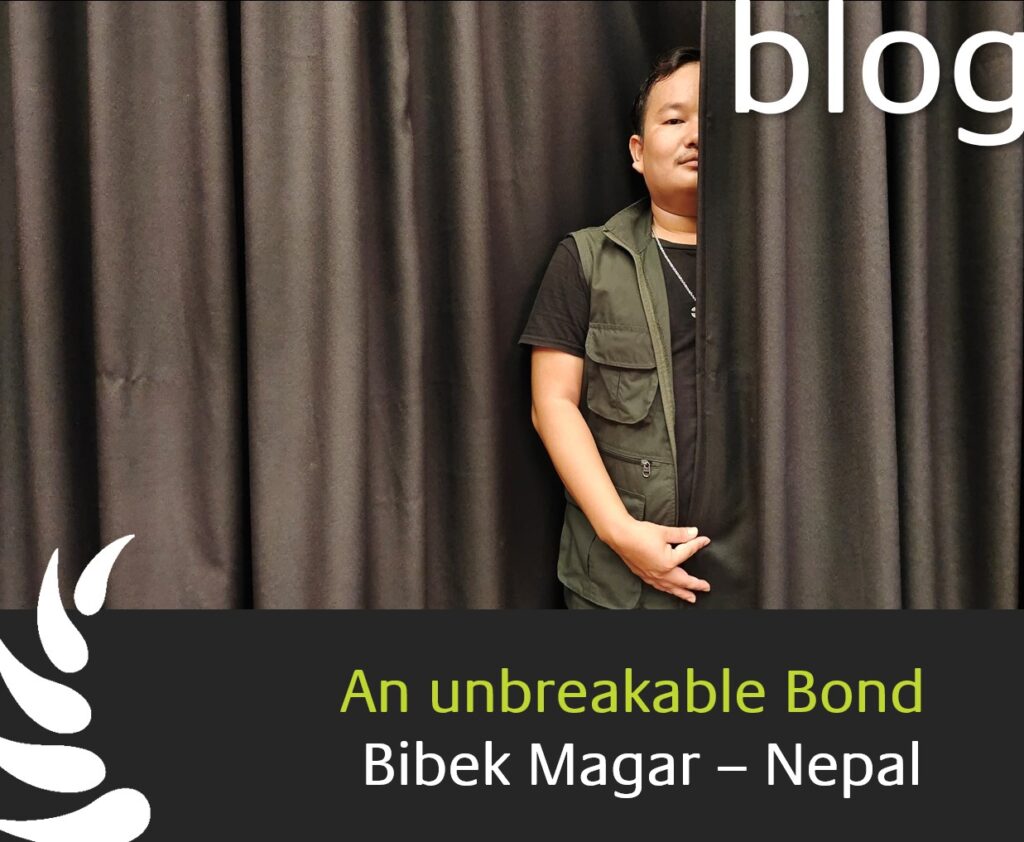Summary
Although Nepal has rather progressive laws that secure the general safety of the LGBTQI community, sexual and gender minorities have historically faced a great amount of stigma, discrimination, and marginalization.
LGBTIQ+ individuals, especially aged 40+ have been highly affected by mental health problems such as depression, self-harm, anxiety, and suicidal thoughts. Herewith must be said, that just being LGBTIQ+ doesn’t cause these problems. As a young, confused gay boy in Nepal, Bibek was constantly bullied by everyone around him, except at home where his great-grandparents and he shared a loving bond. Now, Bibek feels secure in his identity, and he is armed with the tools to defend himself. But witnessing the discrimination faced by elder members of the LGBTQI+ within their own community fills him with pain and rage which he directs toward changing this mindset.
An Unbreakable Bond
– By Bibek Magar
Nervous and excited, I met Chandra in a busy public park after much texting back and forth. He was the first gay man I had ever met in the 18 years of my life. Through his charming and humorous way of conversation, Chandra made me realize that there was nothing wrong with me; I am gay, and I have the right to a life without discrimination. That was the happiest moment of my life.
Unlike the usual family culture in Nepal, my parents did not force “boys to be boys” or “girls to be girls”. I was a carefree happy child playing with dolls like my girlfriends, dancing like Bollywood heroine Rani Mukerji in the song “Kuch Kuch Hota Hai” while waving my mother’s colourful scarf.
My grandparents and parents were both revolutionary communists who fought the government. I still remember my father and grandfather discussing issues like the divide between the upper- and lower-class; casteism between brahmins and Dalits; Janjati (native communities like us).
I have vivid memories of my father visiting only at midnight when it was safe. He always embraced me with all the love he had, the warmth which I still feel to this day. One night, my father came with clothes and sweets. That was our last meeting. Soon after, he was killed by members of the governmental forces. I was just 10 years old.
My mother was devastated. She would cry at night when she thought we were sleeping. All these circumstances made me empathetic, and comfortable in expressing my emotions and understanding women’s strength and power. Even after they killed my father, the government did not stop harassing my mother. At our grandparent’s suggestion, she left for Kathmandu with a heavy heart.
My little sister and I were then taken care of by my great-grandparents. From being scrawny, I turned chubby with their love of feeding me. At the same time, I became their life support. I would clear their bedpans, bathe them, and wash their clothes, especially when they were sick. We became very emotionally close. I believe I was their favorite grandchild, although my sister would say otherwise.
Outside of my loving home, I had to listen every day to derogatory words such as “Chhakka” or “Hijda”. It was hurtful and made me ashamed of who I am. Usually these derogatory came from a group of macho boys who hung around in my locality. I had to muster every ounce of courage I could to pass by them on the street. And it wasn’t just them, even strangers would call me names, judging my gender expression, walk, and speaking style.
Confused about my feelings and same-gender attraction, I often prayed to God before going to sleep every night to “change my feelings and girlish behavior.” When I woke up, I would try to feel and act as if everything had changed, but that was just my imagination. This led to frustration and, I would curse God for making me like this.
At the age of 18, I came to Kathmandu for higher studies, but deep inside the reason was that I wanted to escape from the judgmental villagers who often humiliated me. And there is when I met Chandra.
Since then, I met several people who are from the community and have been working for our rights and empowerment. Gradually, I built a strong network, and I became eager to learn more about it in a comprehensive manner. I soon realized there were several issues within the community. But one event stood out to me.
I once attended a celebratory pageant show for trans and third-gender women which many LGBTIQ+ people attended. I clearly remember the moment that the younger attendees made jokes, shaming the elderly people’s looks. I felt so strongly for my grandparents and therefore it was even more painful to listen to this. These were some of the first instances of many that demonstrated the discrimination of elder LGBTQI+ people within their own community.
The suicide of five elderly members of my new community during the pandemic solidified my resolve to work with them. Whenever I see elderly LGBTIQ+ individuals, they remind me of my unbreakable bond with my great-grandparents, who always blessed me by saying, “Thulo Thulo Manxe Hunu”: “Become a force for good in life.”
With my organization “Queer Nepal” I aim to create a mentally healthy environment for LGBTIQ+ people above 40 years of age, by providing accessible and specific mental health services, workshops, various kinds of counseling, livelihood support, and advocacy on LGBTIQ+ mental health.



